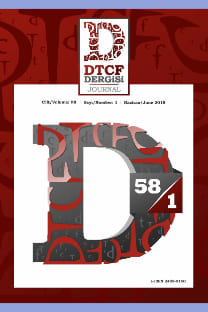Narrative fragments and story-telling in Samuel Beckett's Endgame
Samuel Beckett in oyunun sonu adlı yapıtında anlatı parçaları ve öykü anlatma
___
- ATKINS, Kim (2004). Narrative Identity, Practical Identity and Ethical Subjectivity, in Continental Philosophy Review (2004), 37: 341-366. http://www.springerlink.com/index/U7089356154M5034.pdf, accessed 14 March 2008.
- BAIR, Deidre (1978). Samuel Beckett: A Biography. London: Jonathan Cape.
- BECKETT, Samuel (1970). Proust. New York: Grove. - (1973). Endgame: A Play in One Act followed by Act without Words: A Mime for One Player. London: Faber.
- DIAMOND, Elin (1975). what? who? no! she! - The Fictionalizers in Becketts Plays. Samuel Beckett: A Collection of Criticism . Ruby Cohn, ed. NY: McGraw Hill. 111-119.
- FREUD, Sigmund (1976). Jokes and Their Relation to the Unconscious. James Strachey (trans.), Angela Richards, ed. The Pelican Freud Library. Volume 6. Harmonsworth: Penguin.
- HAWTHORN, Jeremy (2000). A Glossary of Contemporary Literary Theory. London: Arnold.
- HALE, Jane Alison (1992). Endgame: How Are Your Eyes? Waiting for Godot and Endgame: Contemporary Critical Essays. (Ed. Steven Connor). New Casebooks. MacMillan: London. 71-85.
- HERRERO-MARTÍN, R. (2007). Narrative Performance of the Word in Becketts Early Theatre. Tiyatro Araştırmaları Dergisi, 23. Ankara: Ankara Üniversitesi Yay. 193-221.
- KENNER, Hugh (1975). Life in the Box. Samuel Becketts Endgame. Ed. by Harold Bloom. NY: Chelsea House, 41-48. Reprinted in Drama For Students . Vol. 18.
- KEMP, T. P. (1989). Toward a Narrative Ethics: A Bridge between Ethics and the Narrative Reflection of Ricoeur. Kemp, T. Peter and Rasmusson, David, eds. The Narrative Path: The Later Works of Paul Ricoeur. Cambridge. MIT P. 65-88.
- LAUGHLIN, Karen (1988). Sadism Demand a Story: Looking at Gender and Pain in Samuel Becketts Plays. Samuel Beckett: A Casebook. Ed. Jennifer M. Jeffers. Garland: New York. 39-62.
- MARTIN, Wallace (1991). Recent Theories of Narrative . Ithaca: Cornel UP.
- MCQUILLAN, Martin (2000). ed. The Narrative Reader. London: Routledge.
- MILLER, J. Hillis (1998). Reading Narrative. Norman: U of Oklahoma P.
- MORRISON, K. (1983). Canters and Chronicles: The Use of Narrative in the Plays of Samuel Beckett and Harold Pinter. London: U of Chicago P.
- NEVE, Michael (1988). Freuds Theory of Humour, Wit and Jokes. Laughing Matters: A Serious Look at Humour. Ed. John Durant, Jonathan Miller. Harlow: Longman. 35-44.
- POSTLEWAIT, T. (1978). Self-Performing Voices: Mind, Memory and Time in Becketts Drama. Twentieth Century Literature Vol. 24. No:4, 473-491.
- PRINCE, Gerald (1990). On Narratology (Past Present Future). French Literary Studies, 17 (1).
- RICHARDSON, Brian (2001). Denarration in Fiction: Erasing the Story in Beckett and Others. Narrative May v9 i2. 168.
- RICOEUR, Paul (1991) : Life: A Story in Search of a Narrator. A Paul Ricoeur Reader: Reflection and Imagination. Ed. Mario J. Valdes. New York: Harvester. 425-437.
- SCHOLES, Robert and KELLOGG, Robert (1996) . The Nature of Narrative . New York: Oxford UP.
- ST. AUGUSTINE (1992). Confessions. (trans. by Henry Chadwick). Oxford: Oxford UP.
- WORTON, Michael (1990). Waiting For Godot and Endgame : Theatre as Text. The Cambridge Companion to Beckett. John Trilling, ed. Cambridge: Cambridge UP, 67-87.
- ISSN: 0378-2905
- Yayın Aralığı: 2
- Başlangıç: 1942
- Yayıncı: Ankara Üniversitesi Dil ve Tarih-Coğrafya Fakültesi
Narrative fragments and story-telling in Samuel Beckett's Endgame
Karain Mağarası B Gözü'nde tespit edilen arkeolojik hiatüsler
Ön-tür kuramı çerçevesinde Türkçede anlamsal ulamların incelenmesi
Samiha Ayverdi'nin romanlarında betimlemenin işlevleri
Children's literature as a tool for gender appropriation
Bir Kültepe metnine göre eski asur devrinde subartu bölgesi
Birinci Balkan ittifakı, 1866-1868
The acclaimed outsiders: Joseph Conrad and H.G. Wells
Antikçağdan günümüze bir şifa kaynağı: Zeytin ve zeytinyağının halk tıbbında kullanımı
